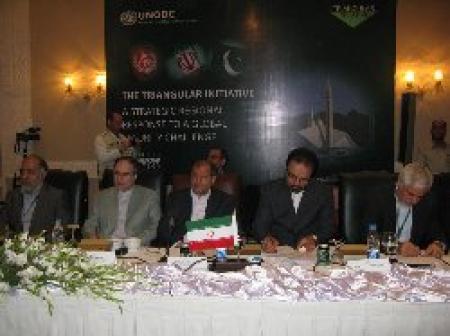ID :
151366
Sat, 11/27/2010 - 14:39
Auther :
Shortlink :
http://m.oananews.org//node/151366
The shortlink copeid
Iran-Afghanistan-Pakistan to issue anti-drug declaration

Islamabad, Nov 27, IRNA -- Ministers of Afghanistan-Iran-Pakistan issued a declaration to fight against drug-trafficking at the end of two-day conference in Islamabad on Thursday, organizers said.
The Minister of Counter Narcotics of Afghanistan, Zarar Ahmad Moqbel Osmani, the Secretary-General of the Drug Control Headquarters of Iran, Eng Mostafa Mohammad Najjar, and the Federal Minister for Narcotics Control, Arbab Muhammad Zahir issued the declaration after their meeting.
Executive Director of the United Nations Office on Drugs and Crime (UNODC), Yury Fedotov, will also be present on the occasion.
Senior officials from the three countries and the UNODC on Wednesday finalized agenda for the ministers’ meeting.
They discussed ways how to enhance the work of the first regional law enforcement operations centre.
The Joint Planning Cell (JPC) in Tehran opened in 2009 to facilitate information sharing and operations aimed at seizing illicit drugs.
The experts also discussed conducting more joint operations to stop the flow of illicit drugs.
Six joint operations have taken place, leading to significant drug seizures – almost 2,500 kilograms of opium, heroin and hashish – and the arrests of at least 74 drug traffickers, the UNODC said.
They also reviewed ways to expand and strengthen border controls between the three states.
The countries have started to open a network of Border Liaison Offices (BLOs) to increase cross-border cooperation between law enforcement agencies.
The Triangular Initiative is facilitated by UNODC and brings together the Ministers from Afghanistan, Iran and Pakistan responsible for drug control.
The three countries focused at finding solutions to the threats posed by drug trafficking in the region by enhancing cooperation in law enforcement. UNODC provides assistance to the three countries in implementing their agreements.
Unofficial surveys suggest drug abuse in Pakistan is on the rise as an estimated 5 million addicts – 3 million from Pakistan’s insurgency-hit northwestern Khyber Pakhtunkhwa province and the tribal areas, alone – are hooked on substances such as heroin, opium and hashish.
Poverty, lawlessness, unemployment and low literacy rates are cited as major reasons for drug use./end
The Minister of Counter Narcotics of Afghanistan, Zarar Ahmad Moqbel Osmani, the Secretary-General of the Drug Control Headquarters of Iran, Eng Mostafa Mohammad Najjar, and the Federal Minister for Narcotics Control, Arbab Muhammad Zahir issued the declaration after their meeting.
Executive Director of the United Nations Office on Drugs and Crime (UNODC), Yury Fedotov, will also be present on the occasion.
Senior officials from the three countries and the UNODC on Wednesday finalized agenda for the ministers’ meeting.
They discussed ways how to enhance the work of the first regional law enforcement operations centre.
The Joint Planning Cell (JPC) in Tehran opened in 2009 to facilitate information sharing and operations aimed at seizing illicit drugs.
The experts also discussed conducting more joint operations to stop the flow of illicit drugs.
Six joint operations have taken place, leading to significant drug seizures – almost 2,500 kilograms of opium, heroin and hashish – and the arrests of at least 74 drug traffickers, the UNODC said.
They also reviewed ways to expand and strengthen border controls between the three states.
The countries have started to open a network of Border Liaison Offices (BLOs) to increase cross-border cooperation between law enforcement agencies.
The Triangular Initiative is facilitated by UNODC and brings together the Ministers from Afghanistan, Iran and Pakistan responsible for drug control.
The three countries focused at finding solutions to the threats posed by drug trafficking in the region by enhancing cooperation in law enforcement. UNODC provides assistance to the three countries in implementing their agreements.
Unofficial surveys suggest drug abuse in Pakistan is on the rise as an estimated 5 million addicts – 3 million from Pakistan’s insurgency-hit northwestern Khyber Pakhtunkhwa province and the tribal areas, alone – are hooked on substances such as heroin, opium and hashish.
Poverty, lawlessness, unemployment and low literacy rates are cited as major reasons for drug use./end





